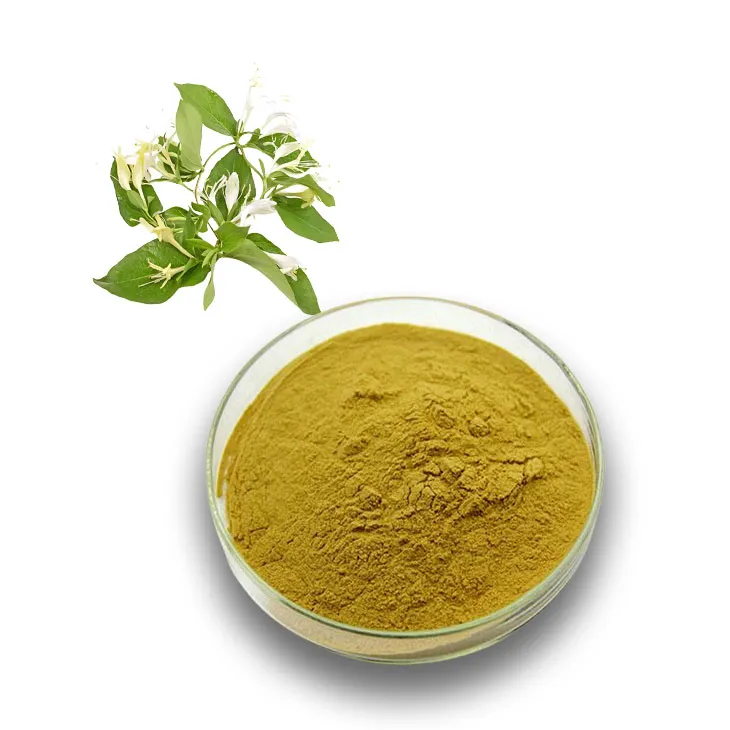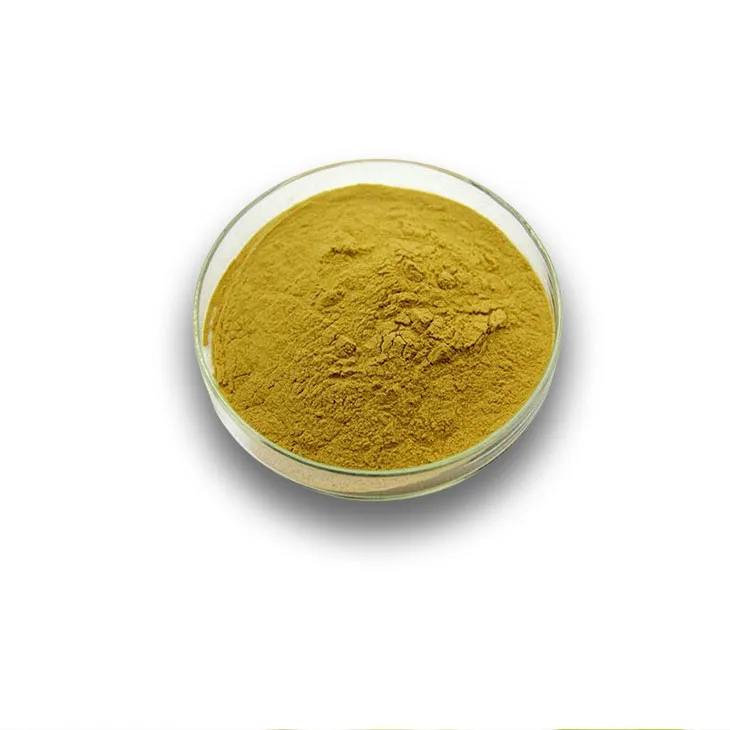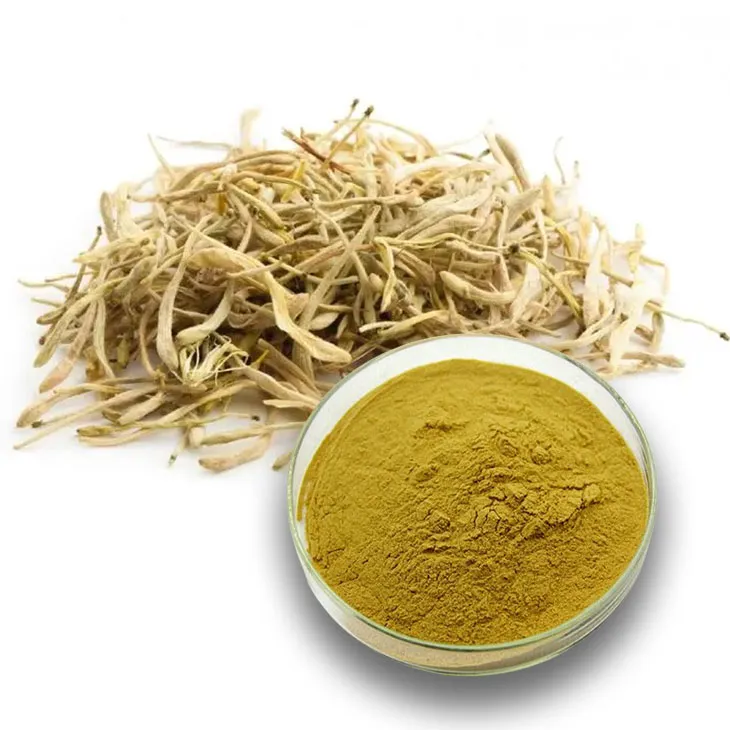- 0086-571-85302990
- sales@greenskybio.com
All the benefits of honeysuckle pollen.
2024-11-13

1. Introduction to Honeysuckle Pollen
Honeysuckle Pollen is a natural wonder that has been gradually gaining recognition for its numerous health - related properties. It is sourced from the beautiful honeysuckle plant, which is known for its sweet - scented flowers. This pollen contains a rich blend of nutrients, bioactive compounds, and elements that work in harmony to provide a wide range of benefits to the human body.

2. Digestive Health Benefits
2.1 Promotion of Digestion
Honeysuckle Pollen is a great ally for the digestive system. It contains enzymes that can help break down food more efficiently. These enzymes play a crucial role in the initial stages of digestion, starting from the breakdown of complex carbohydrates, proteins, and fats. For example, amylase present in the pollen can break down starches into simpler sugars, while proteases can work on proteins to convert them into amino acids. This process ensures that the food is properly digested and prepared for absorption in the intestines.
2.2 Enhancement of Nutrient Absorption
Once the food is digested, the next step is absorption of nutrients. Honeysuckle pollen aids in this process as well. It contains certain substances that can improve the integrity of the intestinal lining. A healthy intestinal lining is essential for the absorption of vitamins, minerals, and other essential nutrients. For instance, it may help in the absorption of iron, which is crucial for the formation of red blood cells and the prevention of anemia. Additionally, it can also enhance the absorption of vitamin B12, which is important for nerve function and the production of DNA.
2.3 Alleviation of Digestive Disorders
Many people suffer from digestive disorders such as indigestion, bloating, and constipation. Honeysuckle pollen can offer relief in such cases. Its anti - inflammatory properties can soothe the irritated digestive tract. In cases of indigestion, it can help to reduce the discomfort and promote a normal digestive process. For those with constipation, the fiber - like components in the pollen can add bulk to the stool and promote regular bowel movements. Moreover, it can also help in reducing bloating by improving the overall function of the digestive system.

3. Role in Hormonal Balance
3.1 For Women's Health
Honeysuckle pollen has particular significance in relation to women's hormonal balance. Women often experience hormonal fluctuations during different stages of their lives, such as puberty, menstruation, pregnancy, and menopause. The compounds in honeysuckle pollen can help regulate the endocrine system, which is responsible for hormone production and regulation. For example, during menstruation, it may help in reducing menstrual cramps and regulating the menstrual cycle. In menopause, it can potentially alleviate some of the symptoms such as hot flashes and mood swings. This is because it contains substances that can interact with the body's hormonal receptors and help maintain a more stable hormonal environment.
3.2 Impact on Endocrine System
The endocrine system is a complex network of glands that secrete hormones directly into the bloodstream. Honeysuckle pollen can support the proper functioning of this system. It can stimulate the pituitary gland, which is often referred to as the "master gland" as it controls the functions of other endocrine glands. By doing so, it can influence the production and secretion of hormones such as thyroid - stimulating hormone (TSH), follicle - stimulating hormone (FSH), and luteinizing hormone (LH). This, in turn, can have a positive impact on various body functions including metabolism, reproduction, and growth.

4. Calming Effect on the Nervous System
4.1 Reduction of Stress
In today's fast - paced world, stress has become a common problem. Honeysuckle pollen can be a natural remedy for stress. It contains certain bioactive compounds that can have a direct impact on the nervous system. These compounds can help to lower the levels of stress hormones such as cortisol. When cortisol levels are high, it can lead to various negative effects on the body such as increased blood pressure, weakened immune system, and disrupted sleep. By reducing cortisol levels, honeysuckle pollen can help the body to relax and better cope with stress.
4.2 Alleviation of Anxiety
Anxiety is another mental health issue that many people face. Honeysuckle pollen can play a role in alleviating anxiety symptoms. It has a calming effect on the nervous system, which can help to reduce feelings of restlessness, worry, and unease. The unique combination of elements in the pollen can interact with the neurotransmitters in the brain, such as serotonin. Serotonin is often referred to as the "feel - good" neurotransmitter, and an imbalance in serotonin levels can contribute to anxiety. By influencing serotonin levels, honeysuckle pollen can promote a more positive mood and a sense of well - being.
4.3 Improvement of Sleep Quality
Stress and anxiety can often lead to poor sleep quality. Since honeysuckle pollen can reduce stress and anxiety, it can also have a positive impact on sleep. It can help the body to relax and unwind, making it easier to fall asleep and stay asleep throughout the night. Additionally, some of the nutrients in the pollen, such as magnesium, can also contribute to better sleep. Magnesium is involved in the regulation of the body's sleep - wake cycle, and a deficiency in magnesium can lead to sleep problems. By providing this essential nutrient, honeysuckle pollen can help to improve sleep quality.

5. Other Potential Benefits
- Immune System Support: Honeysuckle pollen contains various antioxidants and immune - boosting compounds. These can help to strengthen the immune system, protecting the body from infections and diseases. For example, it may contain flavonoids that can scavenge free radicals and enhance the activity of immune cells.
- Anti - Aging Properties: The antioxidants in the pollen can also contribute to anti - aging effects. They can prevent oxidative damage to cells and tissues, which is a major cause of aging. By reducing oxidative stress, honeysuckle pollen can help to keep the skin looking youthful, reduce wrinkles, and improve overall skin health.
- Cardiovascular Health: There is evidence to suggest that honeysuckle pollen may have a positive impact on cardiovascular health. It may help in reducing cholesterol levels, particularly LDL (bad) cholesterol. Additionally, it can also improve blood circulation, reducing the risk of heart disease and stroke.
6. How to Incorporate Honeysuckle Pollen into Your Diet
Honeysuckle pollen can be incorporated into your diet in several ways:
- Smoothies: Add a teaspoon of honeysuckle pollen to your favorite smoothie recipe. You can combine it with fruits like bananas, berries, and mangoes, along with some yogurt or milk for a delicious and nutritious drink.
- Salads: Sprinkle some honeysuckle pollen on top of your salads. It can add a unique flavor and a nutritional boost to your greens, vegetables, and fruits.
- Baked Goods: Incorporate honeysuckle pollen into your baking. You can add it to muffin, cake, or bread recipes. However, be careful not to add too much as it has a distinct flavor that can overpower the taste if used in excess.
7. Precautions and Considerations
While honeysuckle pollen offers many benefits, there are also some precautions to keep in mind:
- Allergic Reactions: Some people may be allergic to honeysuckle pollen. If you have a history of pollen allergies, it is advisable to consult a doctor before consuming honeysuckle pollen. Symptoms of an allergic reaction may include itching, swelling, hives, or difficulty breathing.
- Purity and Quality: Ensure that you are using high - quality honeysuckle pollen. Look for products that are sourced from reliable suppliers and are free from contaminants.
- Dosage: Do not exceed the recommended dosage. While honeysuckle pollen is generally safe when consumed in moderation, excessive consumption may lead to adverse effects.
8. Conclusion
Honeysuckle pollen is a natural substance with a wide range of benefits. From digestive health to hormonal balance, from calming the nervous system to providing other potential health benefits, it has much to offer. By incorporating it into your diet in a safe and appropriate way, you can potentially enhance your overall well - being. However, it is important to be aware of the precautions and considerations associated with its use to ensure that you can enjoy its benefits without any negative consequences.
FAQ:
Question 1: How does honeysuckle pollen aid in digestive health?
Honeysuckle pollen contains certain substances that can stimulate the digestive system. It may help in breaking down food more efficiently and enhancing the absorption of nutrients in the intestines. For example, it might have enzymes or other bioactive compounds that interact with the digestive process in a positive way.
Question 2: In what way does honeysuckle pollen contribute to hormonal balance in women?
Some components in honeysuckle pollen are thought to have an influence on the endocrine system. For women, it could potentially regulate the levels of hormones such as estrogen and progesterone. However, more research is needed to fully understand the exact mechanisms behind this hormonal regulation.
Question 3: How does honeysuckle pollen calm the nervous system?
The unique combination of elements in honeysuckle pollen may interact with neurotransmitters in the nervous system. It could potentially reduce the over - activity of nerve cells that are associated with stress and anxiety, leading to a calming effect.
Question 4: Are there any side effects of consuming honeysuckle pollen?
While honeysuckle pollen has many potential benefits, some people may be allergic to it. Allergic reactions can range from mild symptoms like itching and rashes to more severe ones such as difficulty breathing. Also, if consumed in excessive amounts, it may cause digestive discomfort in some individuals.
Question 5: How can one incorporate honeysuckle pollen into their diet?
Honeysuckle pollen can be consumed in various forms. It can be added to smoothies, mixed with yogurt, or used as an ingredient in homemade energy bars. However, it is important to ensure that the source of the pollen is reliable and free from contaminants.
Related literature
- The Nutritional and Medicinal Properties of Honeysuckle Pollen"
- "Honeysuckle Pollen: A Natural Source for Health Promotion"
- "Beneficial Effects of Honeysuckle Pollen on Human Health: A Review"
- ▶ Hesperidin
- ▶ citrus bioflavonoids
- ▶ plant extract
- ▶ lycopene
- ▶ Diosmin
- ▶ Grape seed extract
- ▶ Sea buckthorn Juice Powder
- ▶ Beetroot powder
- ▶ Hops Extract
- ▶ Artichoke Extract
- ▶ Reishi mushroom extract
- ▶ Astaxanthin
- ▶ Green Tea Extract
- ▶ Curcumin Extract
- ▶ Horse Chestnut Extract
- ▶ Other Problems
- ▶ Boswellia Serrata Extract
- ▶ Resveratrol Extract
- ▶ Marigold Extract
- ▶ Grape Leaf Extract
- ▶ blog3
-
Cranberry Plants and Skin - care Products.
2024-11-13
-
Ivy Extract
2024-11-13
-
Hedyotis Diffusa Extract
2024-11-13
-
Saponin Extract
2024-11-13
-
Sea buckthorn oil
2024-11-13
-
Peppermint Oil
2024-11-13
-
Hericium erinaceus extract powder
2024-11-13
-
Eucommia Ulmoides Extract
2024-11-13
-
Yam Extract
2024-11-13
-
Reishi mushroom extract
2024-11-13
-
Polygonum multiflorum extract
2024-11-13





















